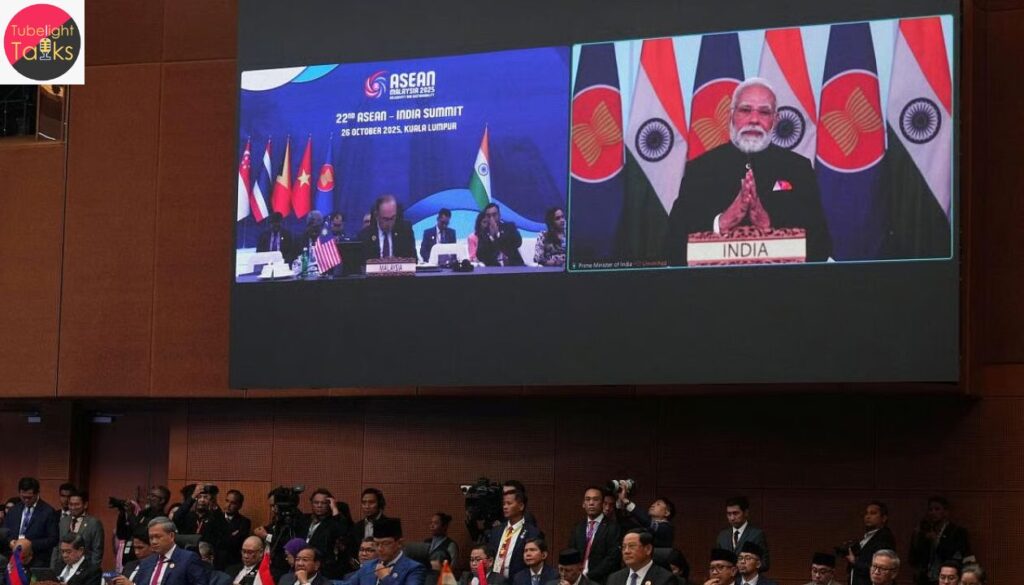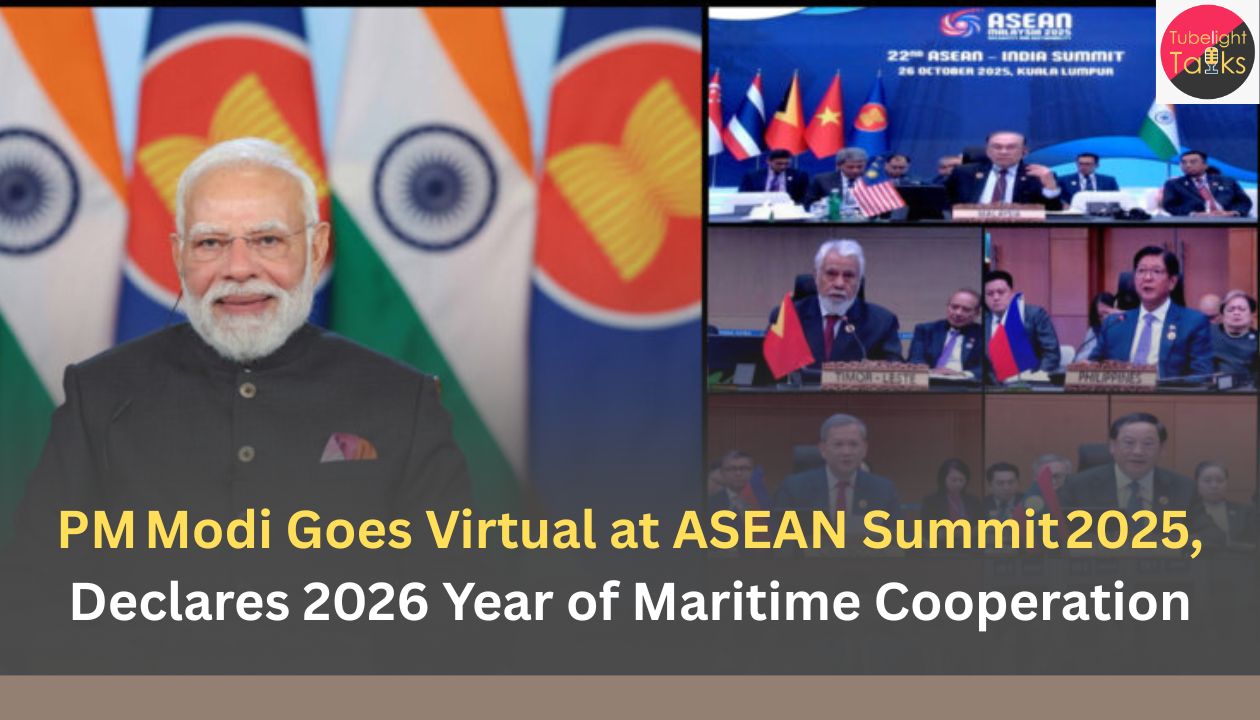PM Modi Goes Virtual at ASEAN Summit 2025, Declares 2026 Year of Maritime Cooperation
PM Modi Goes Virtual: Prime Minister Narendra Modi announced that he would participate virtually in the 47th ASEAN Summit, to be held in Kuala Lumpur from October 26 to 28, 2025. The decision follows India’s call with Malaysian Prime Minister Anwar Ibrahim, during which Modi cited the Diwali festivities as one reason for his non‑travel.
Statement of ASEAN‑India Relations
In his virtual address, Modi reiterated that India views the ASEAN bloc not just as a trade partner but as a “cultural partner” rooted in shared history, values and civilisational linkages. He described the 21st century as belonging to India and ASEAN together, reinforcing India’s “Act East” and “Indo‑Pacific” priorities.
Major Announcements and Policy Focus
2026 Designated as Maritime Cooperation Year
PM Modi declared 2026 as the “Year of ASEAN‑India Maritime Cooperation”, underlining the importance of sea‑lanes, connectivity, trade and regional stability in the Indo‑Pacific.
Trade and Strategic Ties
Modi emphasised that in addition to cultural links, India‑ASEAN relations must deepen through trade, investment and defence‑maritime collaboration. Kuala Lumpur pledged to fast‑track the ASEAN‑India Trade in Goods Agreement (AITIGA) to bolster bilateral economic ties.
Implications for India and the Region
Strategic Outreach
India’s virtual participation highlights a diplomatic approach that balances its ASEAN engagement with other major global partnerships. By designating next year as the maritime cooperation year, India is prioritising the Indo‑Pacific regional architecture.
Economic and Maritime Gains
Deeper maritime cooperation could unlock new trade routes, port‑connectivity projects, supply‑chain investments and蓝‑water engagement for India and ASEAN nations. It may also strengthen India’s leadership in the Indian Ocean and South East Asia.
Cultural and Soft‑Power Edge
Framing ASEAN as a cultural partner shifts discourse from transactional to relational engagement—bringing soft‑power, people‑to‑people links and shared heritage into policy space.
Challenges and Strategic Context
Virtual Attendance vs. Physical Presence
While virtual participation allows flexible diplomacy, face‑to‑face summit presence often yields higher visibility, bilateral meeting opportunities and symbolic weight. Modi’s absence in person may limit certain bilateral outcomes.
Also Read: Modi’s Virtual Attendance at ASEAN Summit Signals Diplomatic Nuance

Geopolitical Trade‑Offs
India continues managing complex relations with major powers (U.S., China) while deepening ASEAN ties. Modi’s attendance virtually may reflect prioritisation rather than disconnect.
Implementation of Maritime Agenda
Designating 2026 as the maritime year is ambitious—success will depend on concrete projects, funding, coordination with ASEAN partners and alignment with broader regional frameworks (e.g., Indo‑Pacific Economic Framework, Quad).
Partnership & Purpose
From the teachings of Sant Rampal Ji Maharaj and the notion of satgyan (true knowledge), international cooperation like India ASEAN ties must be rooted not only in strategy and commerce—but in mutual respect, upliftment and service. True maritime cooperation becomes meaningful when it benefits communities, safeguards livelihoods, promotes sustainable development and honours the dignity of all peoples. The summit hence is a reminder that diplomacy is not purely national interest—it is a collective journey toward meaningful regional harmony.
What to Monitor After the Summit
Bilateral Meetings & Side‑Agreements
Will India hold bilateral talks with specific ASEAN nations on sea‑connectivity, port‑infrastructure, defence‑maritime engagement, or trade deals following the summit?
Progress on AITIGA and Trade Deal
Will the ASEAN‑India Trade in Goods Agreement accelerate as Malaysia and India push to finalise it by end‑2025?
Launch of Maritime Projects
Will 2026 see the rollout of “Year of Maritime Cooperation”‑projects—such as port facilities, shipping corridors, coastal state cooperation, maritime‑security frameworks?
Engagement with Multi‑Regional Frameworks
How will India align its ASEAN outreach with other platforms (India‑Pacific, Quad, BIMSTEC) to ensure synergy rather than overlap?
FAQs: PM Modi and ASEAN Summit 2025
Q1. Will PM Modi attend the 47th ASEAN Summit in person?
No. He will participate virtually and not travel to Kuala Lumpur for the summit.
Q2. What major announcement did he make?
He declared 2026 as the “Year of ASEAN‑India Maritime Cooperation.”
Q3. How does India view its relationship with ASEAN?
India regards ASEAN as a strategic, cultural and regional partner, emphasising shared values, culture and long‑term ties beyond trade.
Q4. What are key areas of collaboration emphasised?
Maritime cooperation, trade connectivity, Indo‑Pacific regional stability, cultural links and deeper strategic engagement.
Q5. What is the significance of the ASEAN‑India strategic partnership now?
With the geostrategic landscape shifting, India’s engagement with ASEAN becomes a central pillar for its “Act East” policy, Indo‑Pacific outreach and regional connectivity strategy.











Discussion (0)